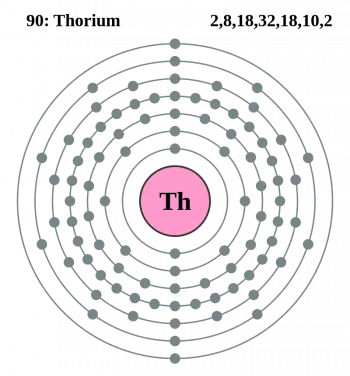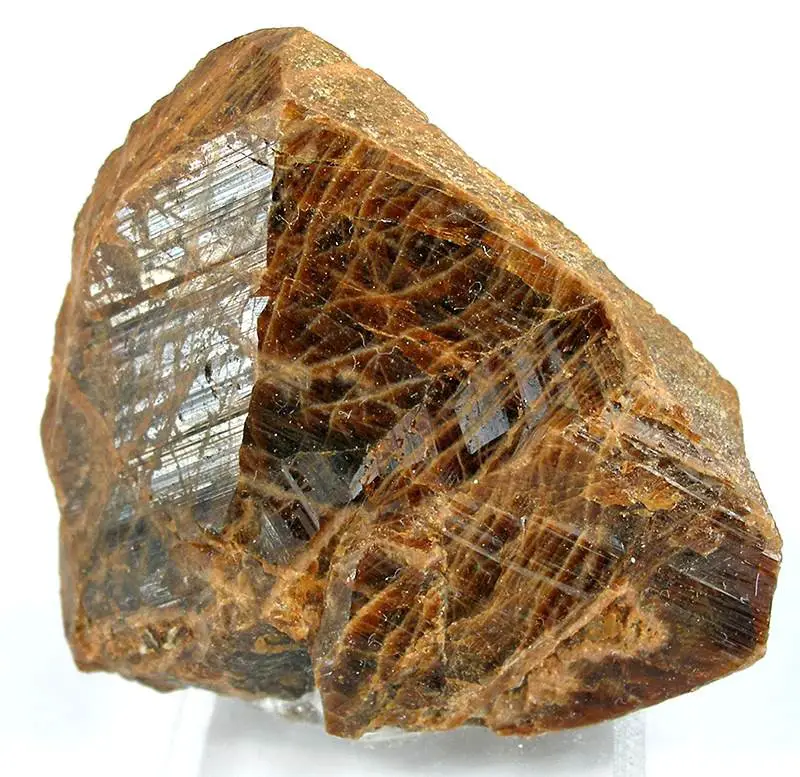
Thorium is a chemical element in the periodic table with the symbol Th and atomic number 90. It is a weakly radioactive, silvery-colored metal and belongs to the actinide series (not to the rare earths, although it is often found associated with them in nature).
Properties and abundance
Thorium is more abundant in the Earth's crust than uranium, approximately three to four times more so. It is found primarily in minerals such as monazite, thorianite, and other rare-earth minerals, which explains the strategic interest of countries with large reserves.
Thorium and nuclear energy
 Thorium is known for its potential as a nuclear fuel, although a key clarification is necessary: thorium-232 is not fissile, that is, it cannot fission directly like uranium-235 or plutonium-239.
Thorium is known for its potential as a nuclear fuel, although a key clarification is necessary: thorium-232 is not fissile, that is, it cannot fission directly like uranium-235 or plutonium-239.
In nuclear reactors, thorium functions as a fertile material. Upon absorbing a neutron, thorium-232 transforms through beta decay into uranium-233, which is a fissile material and can be used to produce energy through nuclear fission.
For this reason, thorium is considered an alternative to the uranium cycle, with potential advantages in terms of:
- security,
- waste generation,
- long-term fuel availability.
Non-nuclear uses of thorium
Besides its nuclear applications, thorium has had industrial uses, although many have decreased due to radiological safety reasons:
- Incandescent shirts for gas lamps (use is very restricted today).
- High-temperature metal alloys.
- Glass and ceramics industry, to improve thermal and optical resistance.
- TIG welding electrodes (increasingly being replaced).
Nuclear power plants that use thorium
Currently, there are no commercial nuclear power plants that operate exclusively on thorium. However, there are experimental reactors and advanced research programs.
Molten salt reactors (MSR)
One of the most promising designs is the Thorium Molten Salt Reactor (MSR ). In this concept:
- The fuel is dissolved in molten fluoride salts.
- The reactor operates at low pressure, which reduces the risk of accidents.
- It may incorporate passive safety systems, such as automatic fuel draining in case of overheating.
Countries with active programs
- India: possesses large thorium reserves and is developing a three-phase nuclear program. The Kamini reactor uses uranium-233 derived from thorium, but it is a research reactor, not a commercial one.
- China: has one of the most advanced MSR programs and has already started up experimental molten salt reactors.
- United States, Canada and Europe: research mainly at the design and prototype level.
The large-scale commercial implementation of thorium remains uncertain and, according to most experts, still requires several decades of technological development and industrial validation.
Advantages and disadvantages compared to uranium
Advantages of thorium
Abundance
Thorium is more abundant and better geographically distributed than uranium, which reduces strategic dependencies.
Long-term waste reduction
Thorium cycles can generate:
- lower amount of transuranic actinides,
- waste with a shorter half-life and lower long-term radiotoxicity (although they are still nuclear waste).
Lower risk of proliferation.
The uranium-233 generated is often contaminated with uranium-232, which emits intense gamma radiation, hindering its military use.
Potentially greater safety
Some designs (especially MSR):
- They operate at atmospheric pressure,
- They reduce the risk of core meltdown,
- passive shutdown systems are enabled.
Lower water consumption (design dependent)
Certain thorium reactors can:
- use alternative cooling,
- reduce water consumption compared to traditional light water reactors (although this is not inherent to thorium, but to the type of reactor).
Disadvantages
The technology is not yet mature.
Most thorium reactors are in the experimental phase. A fully developed industrial chain does not yet exist.
High costs:
Initial development, licenses, new materials, and reprocessing processes make projects more expensive compared to established technologies.
Need for a “starter fuel”
Thorium reactors initially need: uranium-235 or plutonium-239 to start the reaction and generate uranium-233.
Chemical complexity
Especially in MSRs, the handling of molten salts and online reprocessing of fuel is technically demanding.
Electrical efficiency
It has not been conclusively demonstrated that thorium reactors are more efficient in generating electricity than current uranium reactors.
Global thorium reserves
Global estimates are not exact, but thorium reserves are considered to far exceed those of uranium.
Approximate estimates:
- India: ~485,000 tons (mainly in monazite).
- Brazil: ~300,000 tons.
- Australia: significant reserves associated with rare earth minerals.
- Canada: significant deposits, although less quantified.
- Other countries: Norway, the United States, Malaysia and several African countries also have potential reserves.
Thorium properties
Below is a table showing the main properties of Thorium
| Property | Worth |
|---|---|
|
Atomic number |
90 |
|
Atomic mass |
232.0377 u |
|
Chemical symbol |
Th |
|
Cluster |
Group 3 |
|
Period |
Period 7 |
|
Electronic configuration |
[Rn] 6d 2 7s 2 |
|
Physical state |
Solid |
|
Color |
Silver gray |
|
Melting point |
1,750 °C (3,182 °F) |
|
Boiling point |
4,788 °C (8,670 °F) |
|
Density |
11.7 g/ cm³ |
|
Electrical conductivity |
Good conductor of electricity |
|
Radioactivity |
Radioactive |
|
Abundance |
More abundant than uranium in the Earth's crust |
|
Applications |
Incandescent lamps, metal alloys, glass industry, nuclear fuel (potential) |